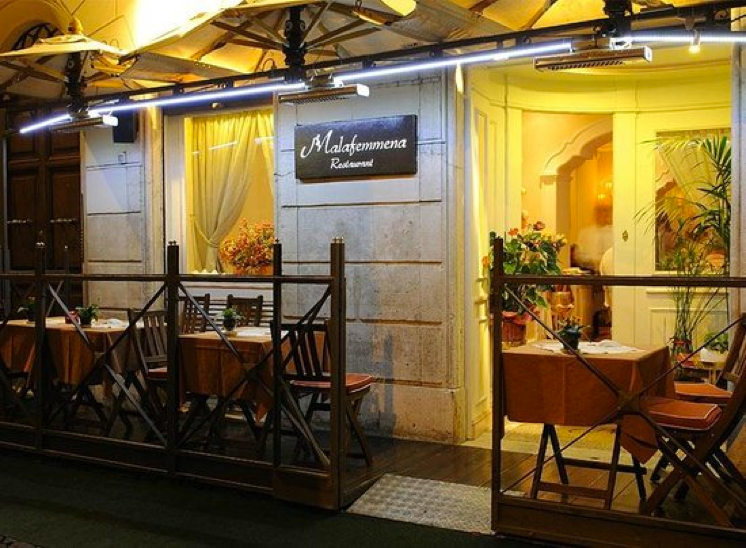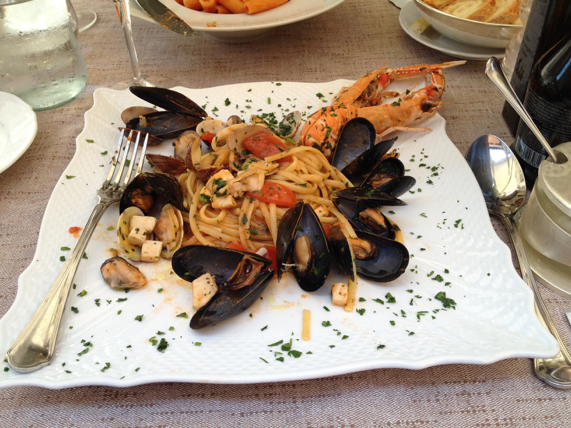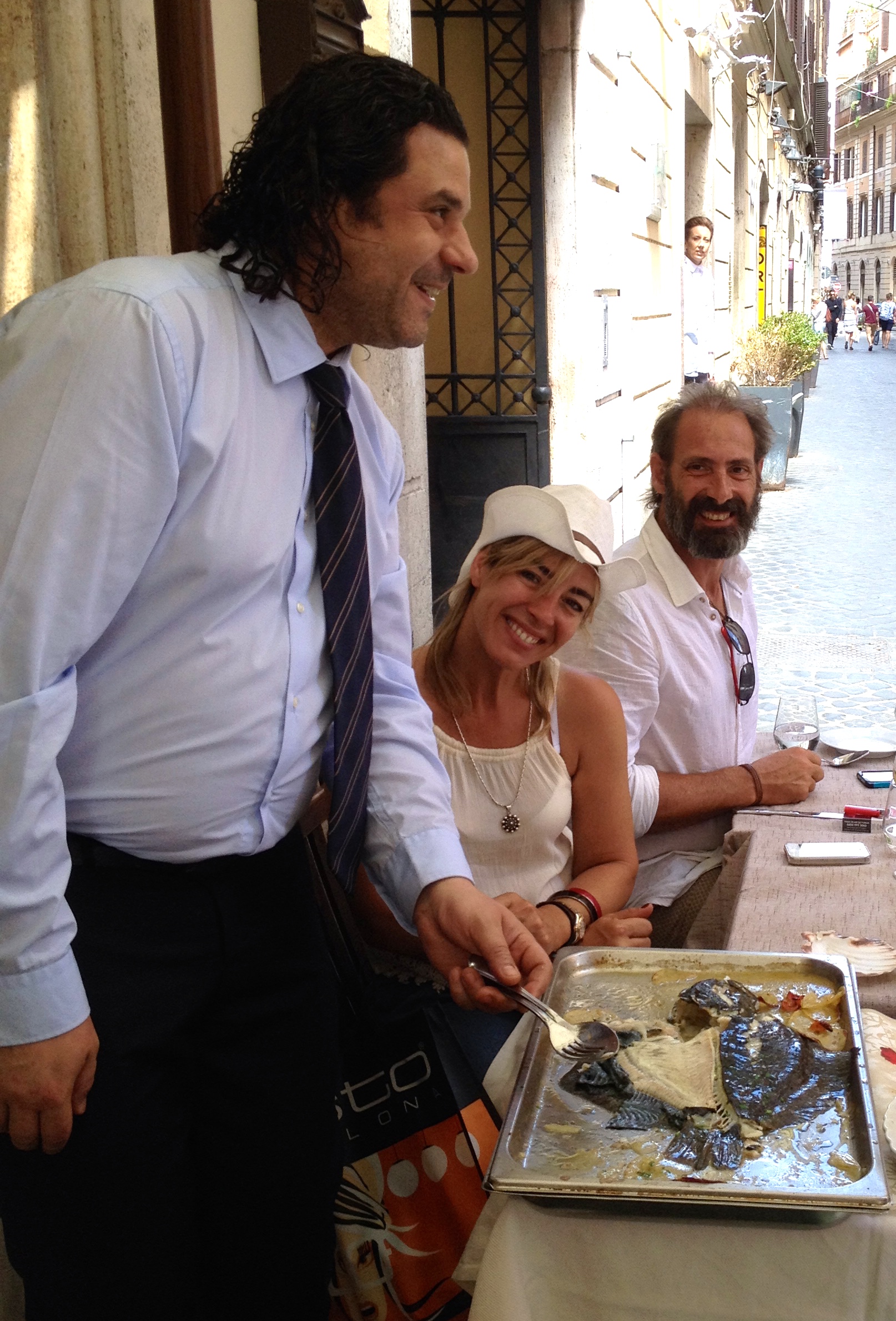It’s mid-afternoon in Rome, and we’re standing in a narrow cobbled street near Malafemmena Restaurant. Piero, the owner, sees us and calls out, “Mr. Jack! Buon giorno! Vieni qua! You come! Sit! Please… I bring you a Limoncello.” Piero, in his too-small rumpled suit, is just clearing his last lunch table and wants us to sit down with him. He’s craving a cigarette and conversation. Via Vittoria is shady, cool and quiet. Three blocks away the Piazza di Spagna is hot and noisy.

Malafemmena is Piero’s restaurant. The name carries a double meaning. The direct translation is “sinful woman.” I ask him why an upscale restaurant in the city’s most exclusive neighborhood bears such a questionable name. He tells me that it’s also the name of a famous Neapolitan song written by a actor about his estranged wife. The explanation seems very Italian.
Piero is from Calabria, Italy’s desert-like “toe of the boot” region. He tells us he’s Calabrian first, Italian second. Calabrians are fiercely proud. Today, Piero is busy but he’s never too busy to stop and offer us a drink. He seats us at an outside table then ducks back into the restaurant. He rejoins us and takes out a cigarette. Feature-for-feature – large nose, sweaty forehead, thinning hair, unshaven, and rumpled suit – Piero is a mess, but his enthusiasm, smile, and Calabrian charm are irresistible. My wife whispers to me, “He’s sooo… attractive.”
He lights up, takes a long drag, and discreetly holds it below the table. He knows Americans don’t like mixing their food and drink with cigarette smoke. His lovely young waitress comes out with three frosty glasses of Limoncello and disappears back into the restaurant.
Piero, the Calabrian, has adopted us. Our small rented apartment just around the corner on Via del Babuino is well situated for our two-month stay in Rome. We’ve been Piero’s “neighbors” for a month and “friends” since day two. We liked the look of the restaurant and stopped for lunch. Since then we’ve shared more than a few meals and Limoncellos. It’s our favorite restaurant and we think it has the best seafood in Rome.

Piero is so voluble and friendly it’s disarming. At times it feels like he’s stalking us. It’s very Italian. We’ve made a joke of it. We can’t walk by without being invited to sit for a Limoncello. Sometimes we walk out of our way to avoid passing the restaurant but his unreserved friendliness is flattering. It’s the kind of welcome we hoped for when we talked about an extended stay in Rome. With Piero we’re not just customers stopping for lunch on our way somewhere else. We’re locals – or something close to it.
Piero is a good businessman in a tough market, but he’s also curious. He sincerely wants to know about us. “Where you are from? What you do in America? Oh, Mr. Jack, you write stories? You like Rome? What do you write? I will read what you write,” he says, “Bring me a story.”
His English is limited but his enthusiasm sincere. It feels good. Rome feels warm and welcoming because of Piero. Travel is a privilege and a “friendship” like Piero’s shows what can happen if you give yourself time and open yourself to a full travel experience. It’s about more than museums and monuments. It’s a human connection in a foreign place.
I call it “slow travel.” The orientation is experiential. It’s about seeing and hearing your surroundings. Think about what’s different and remarkable about the places you visit? What are the impressions you’re likely to take home? Is it warm and welcoming like Rome, or cold and dark like Oslo? Do the people linger in the streets or scurry from home to work with their eyes down? What does the food taste like? Who serves it? Who else is in the restaurant? Are they trendy or blue collar, workers or tourists, slow or in a hurry?
Slow travel counsels us to relax into the experience. Take time to soak up the surroundings, to listen to the sounds, internalize the experience and concentrate on its quality. Eliminate the need to quantify it. Don’t count the museums, monuments, churches, or pyramids seen. The lasting impressions will still include visual components but the more important memories are likely to be the people you meet, the feelings you take away, the differences you note, and the things you learn.
I couldn’t write a travel guide. I’m not a detail person, but I might be able to teach you something about how to travel. Decide what you want from your travel experience. Do you need to see the Sistine Chapel or are you more interested in mining the foreign experience? Would you be happier sitting in a sidewalk café watching the people?
I’m not suggesting you skip the sites, but consider the cost benefit when you travel. Some sites are so busy and full of tourists that they can’t be fully enjoyed or appreciated. It takes patience to accept the slow travel lifestyle. My rule is no more than one attraction per day. Visit the site. Learn as much as you can about it. Absorb it. Cut your senses loose; feel, see, taste, touch, and hear what it’s like.
Meanwhile… On Via Vittoria, we are on our way from the supermarket to our Via Del Babuino apartment. Further down the way, we see Piero putting out fresh linen, straightening the tables, and setting them for dinner. Do we keep going or turn the corner? We keep going.
“Hey, Mr. Jack. Buona sera! You come domani. I buy you a Limoncello.”
He takes a handkerchief from his coat pocket, wipes his forehead, then stuffs it back in the pocket.
“Grazie, Piero. We’ll see you tomorrow.”
“Ciao, amici, ciao. Remember, Mr. Jack, domani, you stop for a Limoncello?”
“Si, si! Arrivederci, Piero. A domani.”
Rome offers such variety. There are the obvious monuments – the Coliseum, the Forum, St. Peters Basilica, Castel San Angelo, Trevi Fountain, and the Pantheon. There are the fashionable cafés of the Via Veneto, the opera venues at Caracalla and the Teatro dell’ Opera, as well as the trendy restaurants of Trastevere. It is a treasure map for the traveler but, more than that it is a city bustling with people and vibrant energy. For us, the little dance with Piero is as important as a walk through the Forum and an important piece in our unique Roman experience.
Grazie, Piero.
Contact Information: Ristorante Malafemmena, Via Vittoria 22 (Piazza di Spagna), 00187 Roma, Italia Telephone +39 06 9727 0424. Email: info@ristorantemalafemmena.it
































